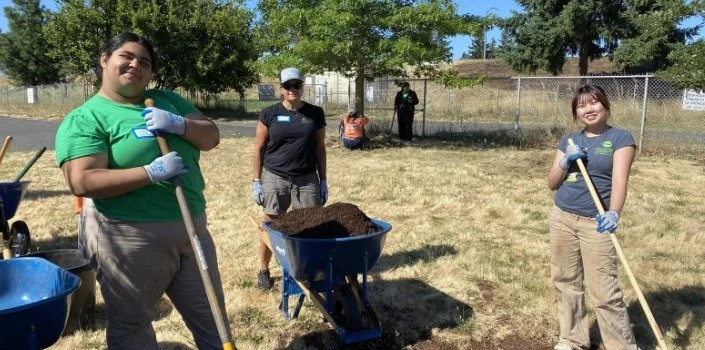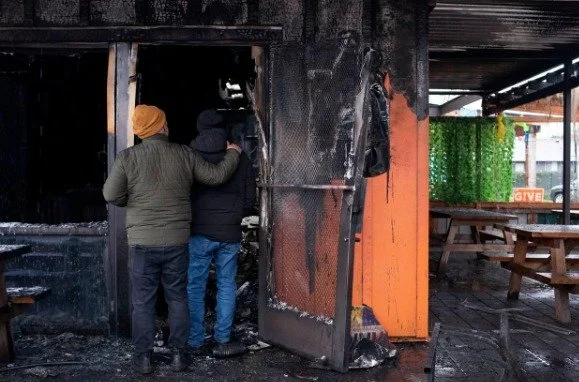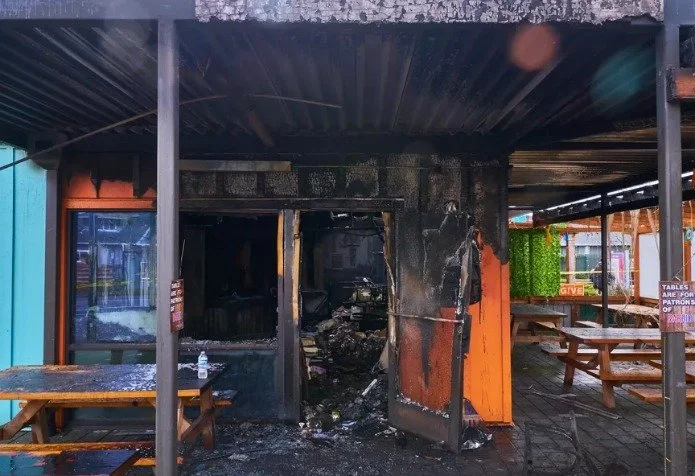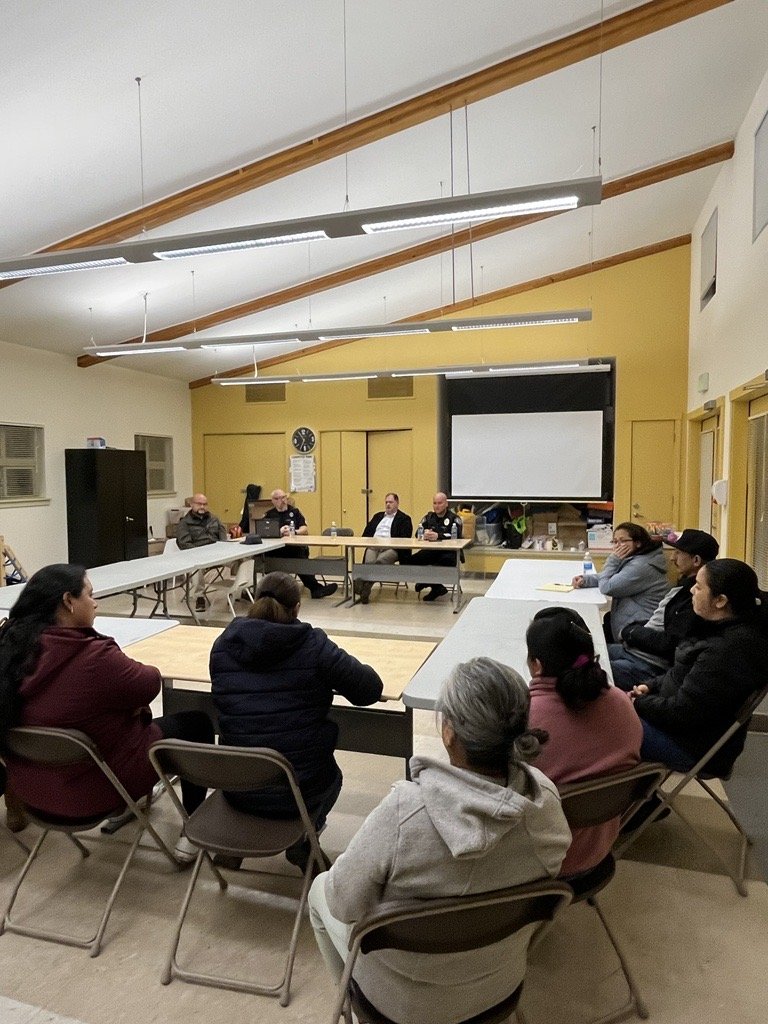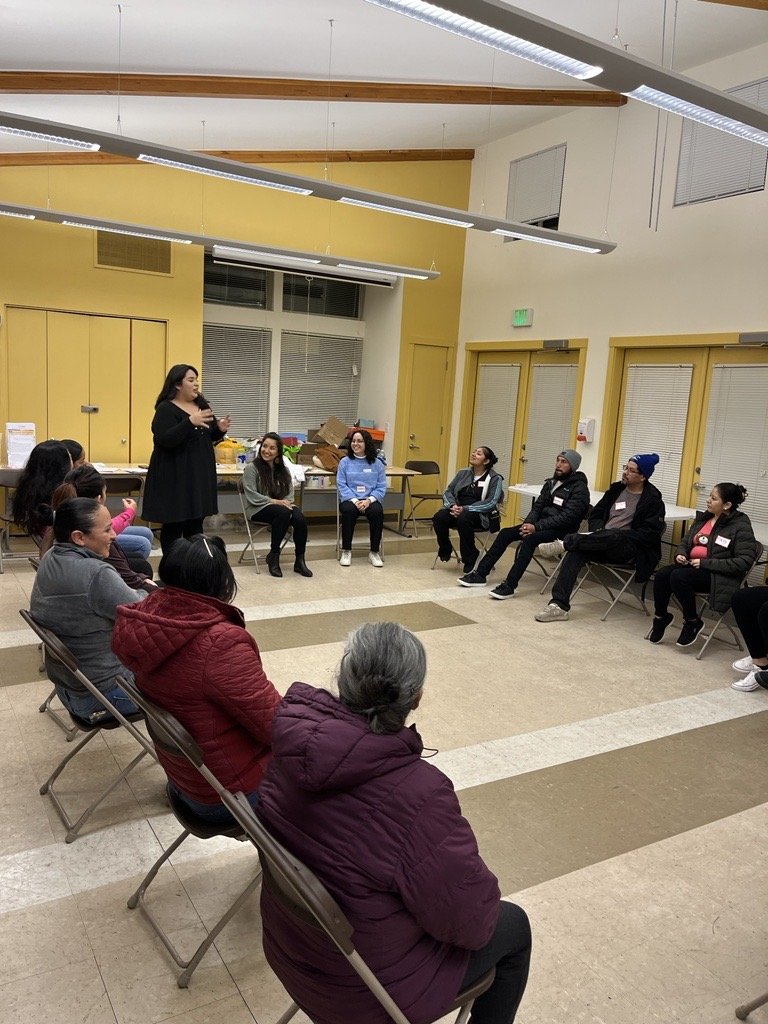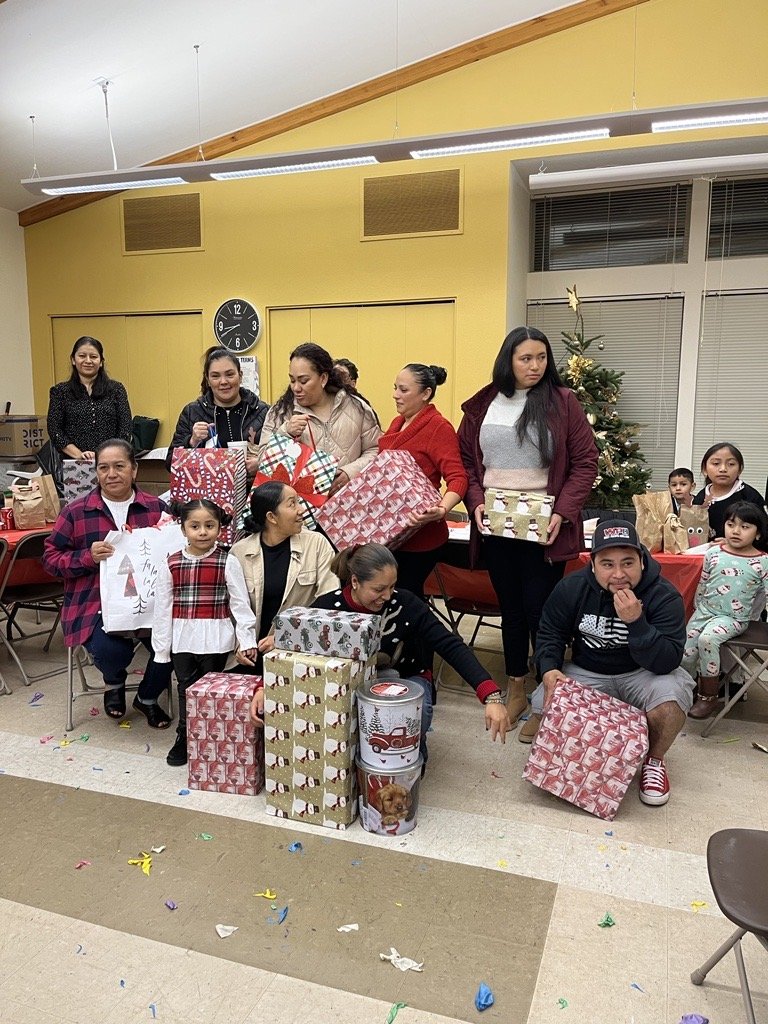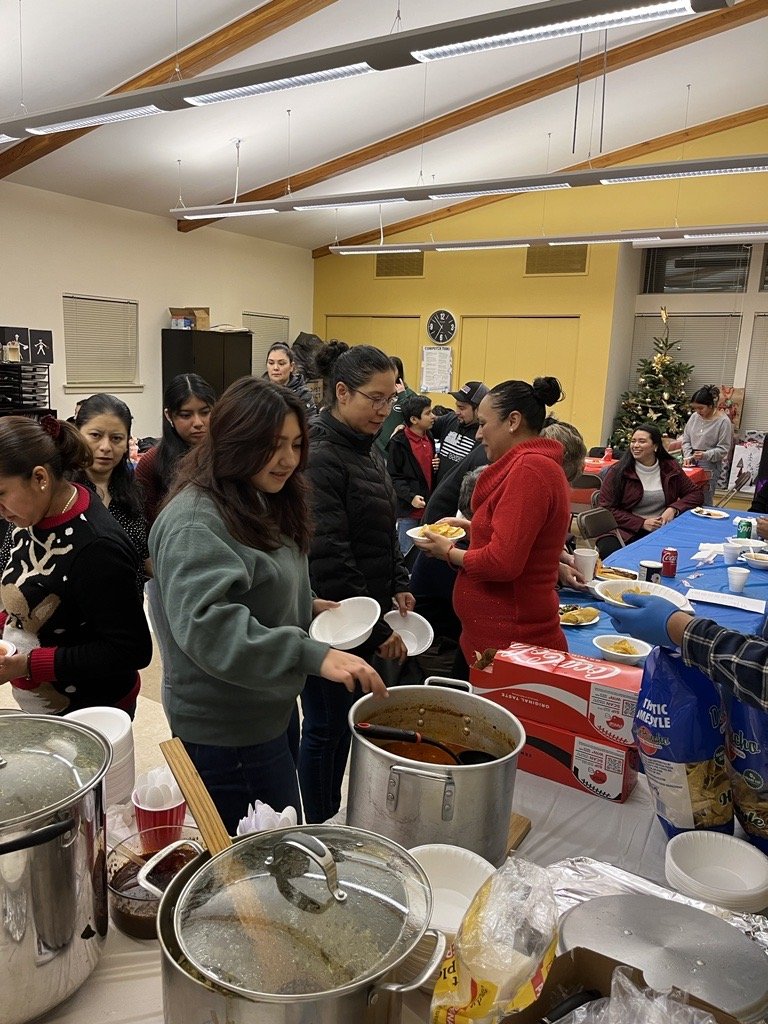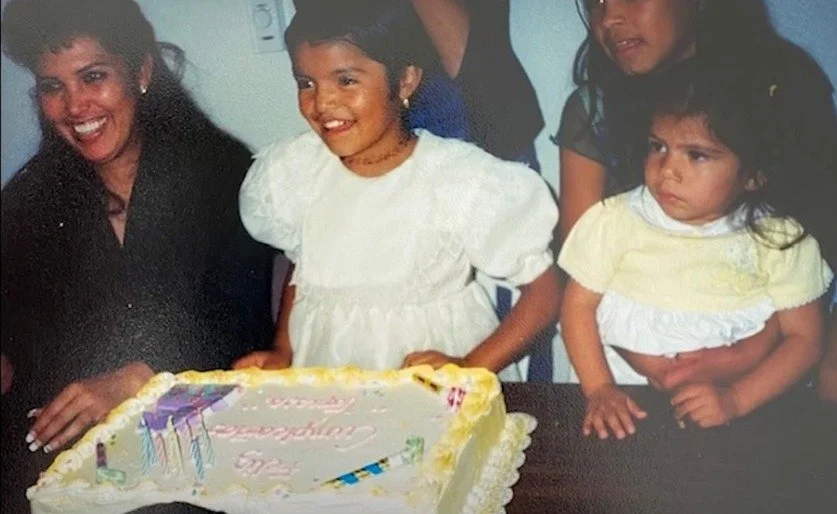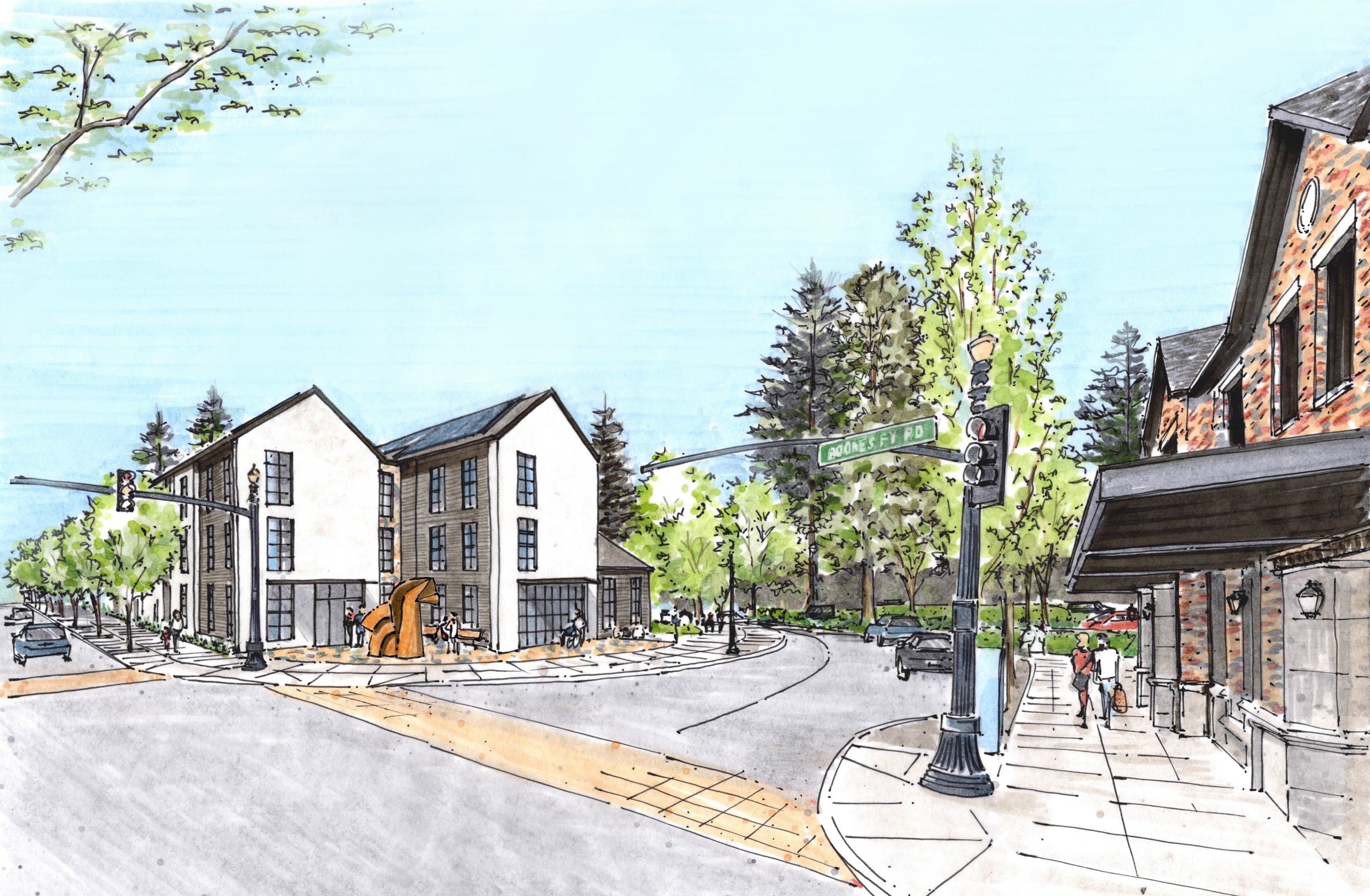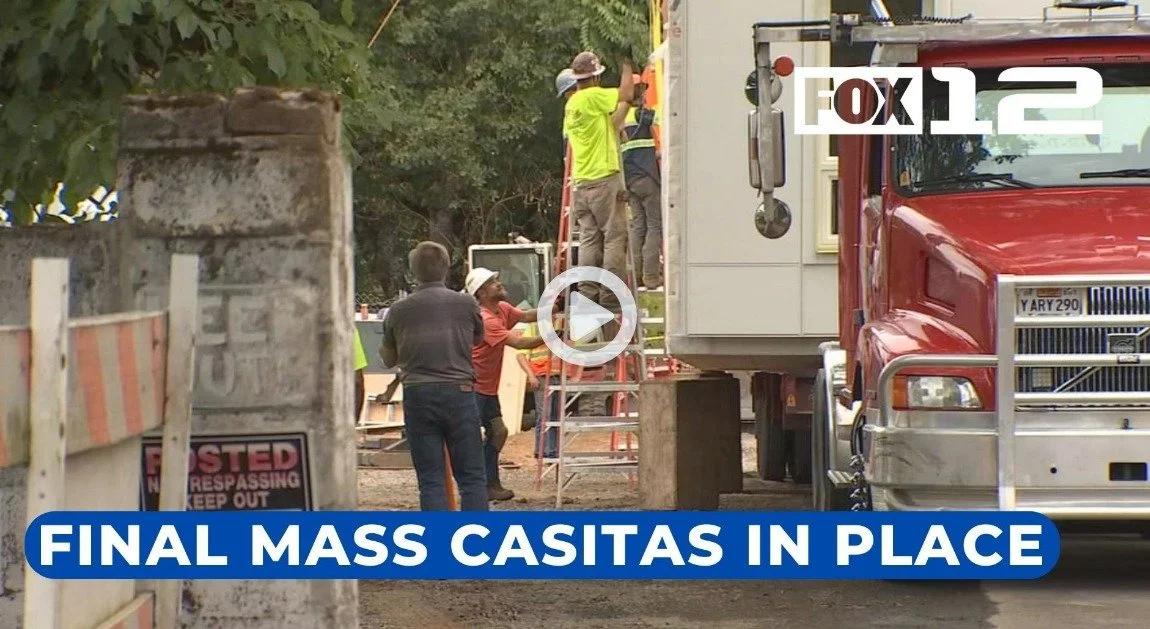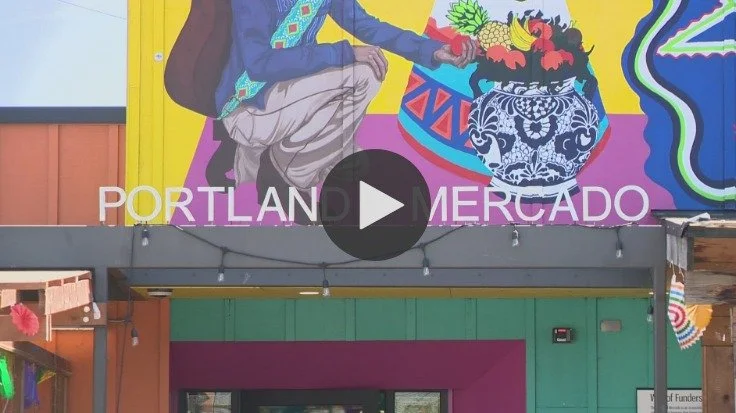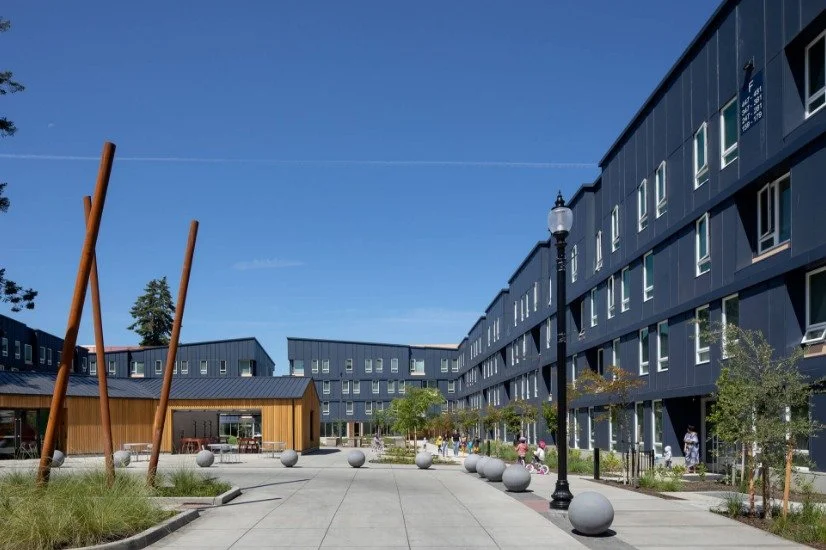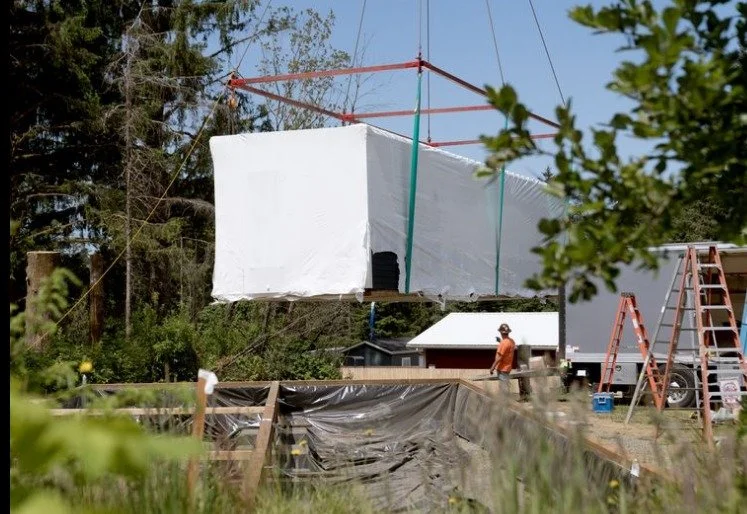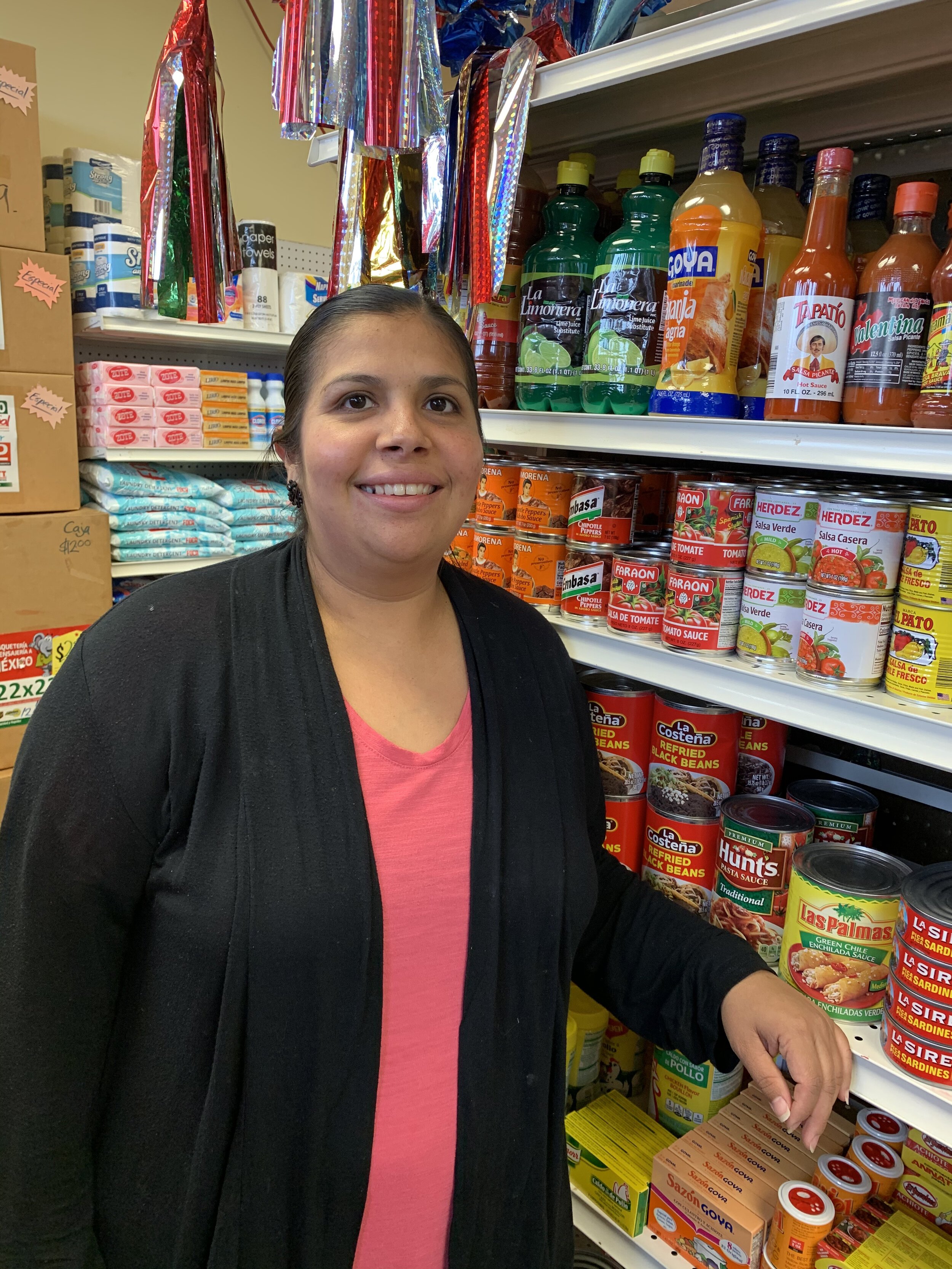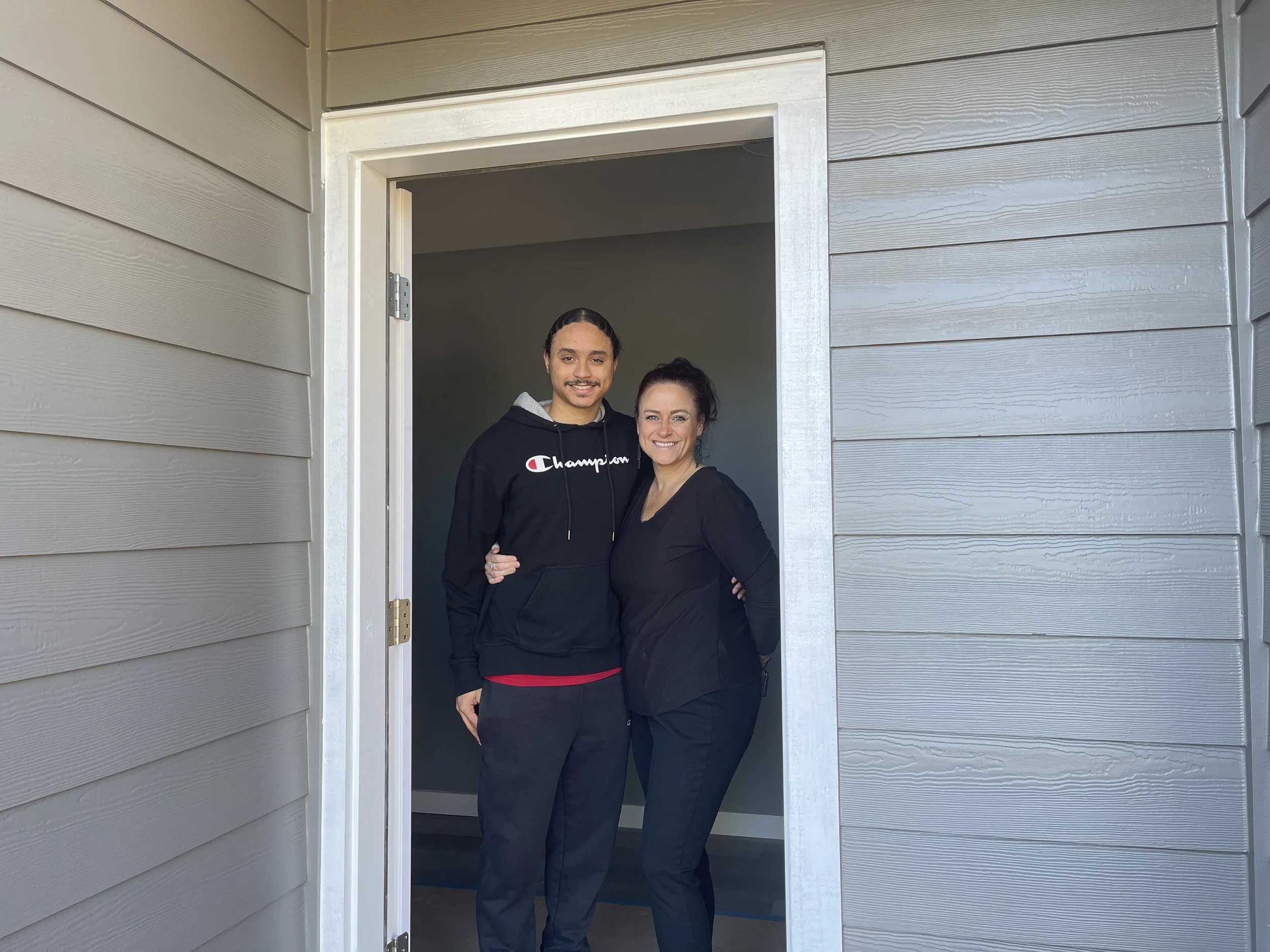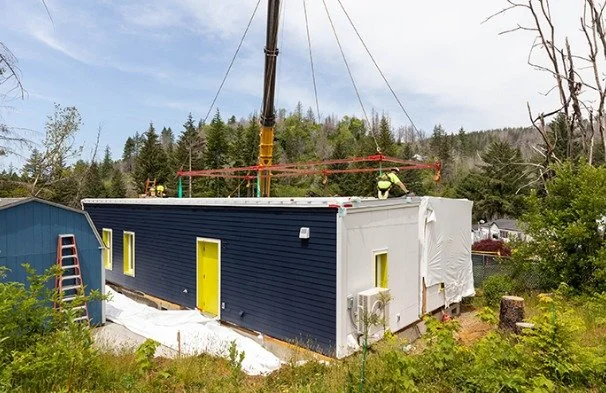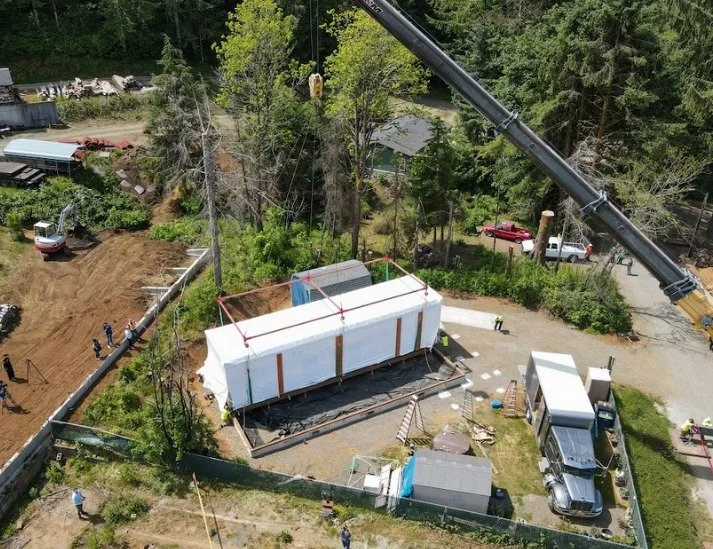Portland Parks & Recreation engages the next generation of environmental leaders through volunteer naturalist training, paid work programs, nature-based camps, field trips, guided walks, and stewardship. Learn more about opportunities available.
In 2006, Hacienda’s Plaza Los Robles, a thriving farmworker community, opened its doors in Molalla, OR. Seventeen years later at 415 Toliver Rd., Plaza Los Robles has evolved into a central location where families come together and connect through Hacienda programming. Read on to learn more about this community and the Hacienda staff that impact the Plaza Los Robles community every day.
The Molalla team stands alongside City Manager Dann Huff, Mayor Scott Keyser, and Risk Manager Andy Oliva during a 2023 community event.
Farmworkers are the backbone of Oregon’s agricultural economy, yet these workers are some of the lowest paid in the state. Low wages and an overall lack of adequate housing created barriers for families whose primary language is Spanish, who don’t speak English, and who often experience challenges assimilating to a new and sometimes unwelcoming culture.
In 2006 Hacienda, in partnership with Casa of Oregon, confronted this issue by developing Plaza Los Robles, a 24-unit affordable housing community in the countryside of rural Molalla, to provide housing for farm workers and their families. Located in beautiful countryside, Plaza Los Robles provides affordable housing near the farms where many of its residents work. What sets this community apart outside of its location is the intentionality placed behind the programming and support systems that address the concerns of families.
At Plaza Los Robles, residents and local neighbors have access to a range of programs offered by Hacienda, including Expresiones, an after-school program designed to support the children of Plaza Los Robles residents. This support has proven to be crucial for families navigating the challenges of assimilation and integration into a new community. Santa Avila, a longtime Plaza Los Robles resident who now serves as a Senior Community Organizer at Hacienda, recalls how as families moved in, it also sparked a sense of belonging among all residents.
Santa, alongside other founding community advocates, saw the needs of families, many of whom are Latino, and began to seek more resources to support community members. In April 2013, after years of being a volunteer, Santa led advocacy work and supported children in the community as the Plaza Los Robles After-School Coordinator. Over time, Santa's tireless advocacy work resulted in the establishment of culturally specific services and partnerships that directly benefit Plaza Los Robles residents. From tax preparation assistance provided by El Program Hispano to instrumental help from partners like the Ford Family Foundation for programs such as Expresiones, these collaborative efforts have significantly enriched the lives of Plaza Los Robles residents.
“My younger siblings and my nephews and nieces were in the program, so I know how much impact Expresiones had to the community of Molalla and Plaza Los Robles…”
Bianca Delgado Mendoza, who embodies the values and legacy of Plaza Los Robles, excitedly joined Hacienda as the newest Program Coordinator for Plaza Los Robles in 2023. Bianca’s family was one of the first to live at Plaza Los Robles and she has seen generations grow up there. “My younger siblings and my nephews and nieces were in the program, so I know how much impact Expresiones had to the community of Molalla and Plaza Los Robles… I wanted to work here because I knew some of these kids since they were very young.”
Bianca believes that Expresiones is an important space for students to access opportunities, such as joining the Lobos and Lobitos soccer team, that otherwise wouldn’t be possible for them. Bianca excitedly mentions “these teams are led by volunteers, and they are known here in Molalla because they are so good!” Los Lobos and Los Lobitos have taken people by surprise and have quickly become a gem in the community after winning many games and tournaments!
Given the demanding workdays of farmworkers, parents frequently depend on after-school programs like Expresiones to provide their children with not only a safe but also a welcoming environment. Bianca says, “I have students who don’t live in Los Robles but are still part of the program. They attend every day even if they don’t live here.”
As Molalla’s Latino community continued to grow it became apparent that additional help was needed to meet these needs. “Families knew they had after-school help for their kids, but there wasn’t any support for their babies… there was a need there” says April Arellano, a Sembrando Semillitas Early-Childhood Educator.
In mid-2023, the Sembrando Semillitas program launched, and April became Molalla’s first Sembrando Semillitas Coordinator. For April, this was more than a job, it was a way she could help parents gain understanding and feel encouraged, something she needed during her motherhood journey with her four-year-old son. “My son has development challenges… I get to help families, but I am also learning more about how to be a mom for my son.” April’s passion for serving Latino parents stems from her desire to see more culturally responsive resources that reflect the community and people she serves. According to April, there are things that she would never have understood had she not had help during her initial years of parenting. She hopes she can shed some light the same way it was granted to her.
Plaza Los Robles has become an important place for the Latino community in Molalla, offering opportunities and pride. The community center in Plaza Los Robles is the preferred location for City Council meetings, where community opinions and ideas are regularly voiced. And from this place stems incredibly passionate individuals. For Santa, breaking ground as the first Latina to collaborate with Oregon Health and Science University serves as a powerful platform to advocate for her community and extend outreach to the Latino population in Molalla. Meanwhile, Bianca is nurturing mentoring connections with students who share a similar background, fostering a sense of solidarity and support. Additionally, April is actively searching for new networks to meet the needs of Latino parents, enhancing access to vital resources and services.
"Queremos ser una voz para la comunidad Latina... we want to be a voice for the Latino community," says Santa. "Plaza Los Robles means a lot to many people in Molalla," adds Bianca. We look forward to seeing what is next for Plaza Los Robles as they continue to advocate for and with the community they serve.
Muchas gracias to the Molalla team for pioneering Hacienda programming. We know Plaza Los Robles will continue to demonstrate its community strength for years to come.
Click here to learn more about Hacienda’s Youth and Family Services.
Vanesa Mendoza-Cruz shares how her desire to SERVE Our community is a direct reflection OF her personal journey. Read more about Vanesa’s story as A hacienda resident to chief of staff to the ceo.
Vanesa Mendoza-Cruz is an example of what it means to exude tenacity, determination, and passion for her community. Most recently named Hacienda’s Chief of Staff, Vanesa has inspired our team and community through her engagement and community advocacy. Throughout her life, Vanesa has demonstrated the importance of elevating voices and stories that speak the truth of our community’s spirit. Read more about Vanesa’s story.
Vanesa’s journey with Hacienda began twenty-four years ago upon her arrival from Oaxaca, Mexico to NE Portland at age eight. Like many immigrants, her family’s arrival in the United States signified a moment of hope and change. Her childhood was shaped by Portland’s Cully neighborhood. She grew up attending neighboring schools, and lived in Hacienda’s Clara Vista community in apartment thirty-nine; Vanesa’s first home during a time that gave her a place of belonging. “A lot of my memories since I arrived in the United States here happened there in that apartment …”
As her journey into adulthood began, Vanesa found herself feeling a desire to serve and give back to the community that supported her. After three years of working in the banking industry, she felt compelled to fulfill this passion by finding opportunities to directly engage with community. It was during this waiting period that a temporary three-month Data Entry position opened for the then-Portland Niños program, now Sembrando Semillitas. It wasn’t before long that her passion for our work and community was noticed, and Vanesa transitioned into the role of interim Executive Assistant to the CEO. Yet, due to the role’s short-term nature, she became an Administrative Assistant within the Hacienda’s Real Estate Development program. “I pretty much have worked in every department except Economic Opportunity…”
As fate would have it, the full-time Executive Assistant position became available and she was offered the opportunity given her natural skillset. For Vanesa, it was both exciting and nerve-wracking; “It was intimidating but I gave it a shot and said yes.” Little did she know her yes to the challenge would result in a six-year career as our CEO’s executive assistant.
What’s next for Vanesa? She has proudly accepted a recent promotion as Chief of Staff to the CEO.
“It’s the ‘Hacienda Effect’, everyone who’s worked or been part of Hacienda ends up returning somehow regardless of where they go…”
Vanesa strives to serve her community, and as she explains it, “…meet our communities where they are at.” Meeting communities where they are at means understanding their needs and goals and creating awareness of the various opportunities accessible to them. It means creating a seat at the table but making sure you’re also heard at the table once you’re there.”
Raising awareness for the needs of our Latino and low-income communities is one of the primary ways Vanesa believes change can occur. Often, community members don’t know the resources they can access, such as schools or after-school programs, so Vanesa makes it a point to inform others and advocate for them.
Time and time again she has seen Hacienda’s impact and its commitment to uplifting our communities. “It’s the ‘Hacienda Effect’, everyone who’s worked or been part of a Hacienda ends up returning somehow regardless of where they go… Our residents are the main example of this.” For Vanesa, her journey is a clear example of this “Hacienda effect” as her experience as a Hacienda resident led her to return to make a difference and be a leader in her community.
When looking to the future, Vanesa is excited to continue her work at Hacienda and use her wisdom as well as her personal story to help the organization meet communities where they are. As the new Chief of Staff to the CEO, she aims to foster an environment of hospitality and promote the needs of community members. “I’m looking forward to what’s to come and to continue this work and find ways to meet other community needs. We can work on mental health and see the youth in our programs fulfill their dreams from beginning to end.”
Vanesa’s story is an example of resilience and passion. Her impact continues to bring unity and hope to many. Let’s celebrate her newest role as Chief of Staff to the CEO and her continued efforts to raise individuals within our communities! Felicidades, Vanesa!
Hacienda CDC programs encompass our values. Learn more about Hacienda’s mission by clicking here.
Free community-focused college course supporting participants in connection building and networking.
Read more to learn about this program and eligibility.
Humanity in Perspective (HIP) is a free, for credit, college level humanities course for individuals living on low incomes and/or face barriers to continue their education.
In addition to a free course, all class-related readings are provided. Upon fulfillment, participants receive transferable undergraduate credits as well as a certificate of completion.
This unique and incredible course has been made possible through a partnership between Oregon Humanities, Bard College, and Portland State University’s College of Liberal Arts and Sciences.
To Register: View the list of upcoming courses and complete a short, noncompetitive registration form located on the HIP website.
Questions? Contact Rozzell Medina, HIP’s Program Manager and Lead Instructor at r.medina@oregonhumanities.org or (971) 361-9883.
Hacienda’s vision will bring 55 new affordable apartments to Lake Oswego
LAKE OSWEGO, Ore.— Clackamas County has granted preliminary funding for Hacienda Community Development Corporation (CDC) to proceed with its proposed affordable housing community in Lake Grove. Hacienda CDC, Oregon's largest Latino-led community development organization, is dedicated to addressing the critical need for affordable housing, particularly for underserved populations. This significant development will be Hacienda CDC's third community in Clackamas County and furthers their commitment to provide affordable housing and holistic programming to communities across the region.
Hacienda CDC's proposal envisions a three-story, elevator-served building on Boones Ferry Road that will provide 55 new affordable rental units and include on-site resident services provided by Hacienda CDC, as well as a host of culturally-specific support and programming for youth and families.
Mackenzie and Access Architecture have united to design the community project that Colas Construction will build. The project site will include open and covered seating, an art-filled plaza, a nature-based playground, and a native plant garden. The community will also feature energy-efficient appliances, 100% electric building systems, rooftop solar panels, passive solar design, and incorporate universal design principles and trauma-informed design, ensuring accessibility, and comfort.
"We are excited to bring much-needed affordable housing options to Lake Oswego and continue our work in Clackamas County. We are honored to have been selected by the County to provide community members with the housing they need and deserve," said Ernesto Fonseca, CEO of Hacienda CDC.
The final community design will be informed by Hacienda’s community engagement process beginning in Fall 2023 and will ensure that the building aligns with the needs and desires of residents and community members. Hacienda is currently seeking community-based organizations and support agencies in the area that would like to be involved in community engagement efforts. Following community engagement, the project will seek approval through the City’s land use development review process.
"Creating housing that is accessible to our full community means creating housing affordable to a wide variety of families through non-profit led development partnerships. The Boones Ferry Road location - with access to high quality schools, premier parks and natural areas, close to employment, transit, and regional access - is exemplary of a high opportunity location befitting the needs of future residents,” stated City of Lake Oswego Mayor Joe Buck. “We are grateful to the neighbors and community members who served on the developer selection committee and are excited to welcome both Hacienda and our future neighbors into our incredible city.”
The Lake Grove project will provide affordable housing to a diverse population, including families and individuals facing homelessness or imminent displacement who require permanent supportive housing (PSH). Out of the 55 apartments, 20 will be rent-restricted to 30% of the Area Median Income (AMI), with 10 of those units dedicated to PSH through coordination with the Housing Authority of Clackamas County (HACC). Supportive services will be provided by New Narrative. The remaining apartments will be comprised of varying unit sizes and rents accessible to low-income and working-class individuals and families earning 60% AMI or below.
“We are delighted that our affordable housing bond dollars will provide 55 more affordable apartments in Lake Grove,” says Board of County Commissioners Chair Tootie Smith. “I applaud Lake Oswego’s commitment to affordable housing, which allows the local workforce community to live closer to their jobs in high-cost areas. This new project helps Clackamas County meet our goals to address homelessness and ensure a safe community for everyone who lives here.”
While Clackamas County's approval is a significant milestone, the project's final endorsement is pending from Metro. Hacienda CDC remains committed to working closely with all relevant stakeholders to move the development forward and provide much-needed affordable housing options for the Lake Grove community. The project is expected to break ground in Fall of 2024.
###
We are building a safe Clackamas County where all people thrive, are celebrated for their diverse identities, and know they belong. Our strategic priorities are to build public trust through good government, grow a vibrant economy, build a strong infrastructure, ensure safe, healthy and secure communities, and honor, utilize, promote and invest in our natural resources.
Lake Oswego, Clackamas County’s largest city, is known for its peaceful neighborhoods, natural beauty, recreational and cultural amenities, highly-rated schools, and sense of community. With a population of approximately 41,000, an extensive parks system, and a full range of retail and commercial services, Lake Oswego is one of the most desirable places to live, work, and play in Oregon. Lake Oswego is proud to be a full-service City with a complete range of municipal departments including police and fire protection, an award-winning library, and a well-maintained parks system. There is a strong sense of community pride as evidenced by the range of City Boards and Commissions, more than 20 neighborhood associations, and a number of civic and cultural organizations. We strive to be a community where any family or individual feels a true sense of belonging. Whether you live in Lake Oswego, work here, or visit, Lake Oswego hopes you see yourself reflected in aspects of our diverse community life.
Do you have an idea for a new business or a product or service that expands your current business? You could win $20,000 for your entrepreneurial journey.
Read more about how to wear a life jacket, the importance of water safety, and how to protect yourself and your loved ones this summer.
Did you know body heat can be lost four times faster in cold water than in cold air? When your body hits the water, you can experience cold shock—rapid breathing, a spike in heart rate and blood pressure. Wearing a life jacket, even if you know how to swim, is the best thing you can do to stay safe in the water this summer and any time of the year!
How to fit a life jacket:
The life jacket has to fit to do its job. Keep these tips in mind when selecting a jacket for you. Life jackets come in many shapes, sizes, colors and materials. No matter which style you choose, it is very important that you choose one that's not too big, not too small, but just right. http://oregonmetro.gov/watersafety
When shopping for a life jacket, size matters. Rather than getting one to grow into, make sure the jacket fits snug on the user.
It’s important that a life jacket fits properly—check the label for height and weight requirements.
Water safety for all ages:
Regardless of your age, anyone can learn how to swim. It’s never too late to learn basic swim and water survival skills. Swim lessons are hard to come by this summer, but some lessons might still be available in your area:
o Tualatin
o Portland
In general, it’s always best to teach children to always ask for permission to go near water. Continue to supervise around water, even once kids get older.
Remember:
Knowing how to swim will not drown-proof any person at any age.
Drowning isn’t just a risk to young kids. Many drowning victims are young adults, especially in open water.
Never swim alone. Use the buddy system, even when swimming with a large group of friends.
Don’t use alcohol or drugs before or while swimming, diving or supervising swimmers.
Overall Safety Tips:
Here are some things to keep in mind once children enter adolescence:
Learn how to swim. It’s never too late to learn basic swim and water survival skills.
Continue to supervise. It can save lives. Knowing how to swim will not drown-proof any person at any age. Never swim alone. Use the buddy system, even when swimming with a large group of friends.
Choose natural water swimming spots carefully. Swimming in a river or lake is very different from swimming in a pool. Be aware of the risks before you go.
Wear a life jacket.
Lower your risk of drowning: learn to swim, bring a buddy, know the risks of natural water and plan your trip.
The East County Library will be an entirely new building similar in size to the Central Library in downtown Portland. Help Multnomah County better understand your needs and interests by filling out our quick 3-question survey at the link:
English Survey: ECL - Art Survey (English) (surveymonkey.com)
Spanish Survey: ECL - Art Survey (Spanish) (surveymonkey.com)
Vietnamese Survey: ECL - Art Survey (Vietnamese) (surveymonkey.com)
Chinese Survey: ECL - Art Survey (Chinese) (surveymonkey.com)
Russian Survey: ECL - Art Survey (Russian) (surveymonkey.com)
Submit your response before no later than July 16th.
Multnomah County is looking forward to dreaming big with you and they can't wait to hear your ideas!
Hacienda CDC’s Empresarios programming supports entrepreneurs to start, grow, and scale their businesses. Read more about our featured Empresario and learn about our amazing community of small business owners.
Country of Origin:
Sinaloa, Mexico
Significance of Name:
The store name is a tribute to the mother’s name.
Goals for Business:
Brendas goal is to someday be able to grow her business enough to offer a job to community members and to potentially be able to have to give out scholarships to students and people who are in the financial need or with obstacles which limit their resources such as DACA.
Meet Brenda Reyes
She is the owner of Tienda Doña Maria. Brenda moved to the U.S. in 1995, and is a current DACA recipient. She grew up in the NE Cully neighborhood all her life, alongside her family. As she grew up, she realized there was a lack of stores that offered products from Latin America and the services that her community used. This is what sparked her entrepreneurship. Her goal to provide for the neighborhood and surrounding areas to help out those who had limitations with regards to travel and the language barrier.
Tienda Doña Maria
Tienda Doña Maria is a Mexican grocery store where you can find phone cards, money transfers, pay bills, shipments and much more! Established in 2009, the store has supplied the community around Hacienda CDC’s headquarters with groceries, and services which commonly used.
Hacienda CDC’s latest Accessory Dwelling Unit (ADU), built in partnership with Community Vision, will offer Christin a supportive, on-site, affordable housing solution for her adult sons with disabilities.
Hacienda’s Small Homes Northwest initiative aims to identify new housing solutions to our state’s affordable housing crisis by building and demonstrating the use of ADU’s as affordable housing and offer a unique housing model in dense residential urban areas. Recognizing the urgent need for such housing options, Hacienda CDC embarked on this project and has once again partnered with Community Vision to make a positive difference in the lives of families like Christin and her sons, KeLani and KeJon in Gresham, Oregon.
Christin and her family experienced numerous challenges due to the lack of stable and affordable housing options for adults with differing abilities. Christin, who became a homeowner by purchasing a land trust home with Proud Ground, looked for supportive housing for her oldest son, but only found long waitlists and high costs that her family could not afford. The chance to have an ADU in her backyard offers her sons the opportunity to achieve independence. Her oldest son will move in first, and when her younger son is ready, the second bedroom will be his. Once they are ready to move out on their own, Christin will be able to rent her home to a future low-income tenant, providing a modest stream of income.
The benefits of an accessory dwelling unit are particularly advantageous for individuals needing to stay close to home. Joe WykowskI, Community Vision’s Strategic Housing Outreach Consultant explains, “ADU’s provide an anchor to neighborhoods and the opportunity to live a more self-determined life for individuals experiencing disabilities.” And though still in the final stages of construction, Christin and her family are already hopeful for the future.
“There is no way I could have done this alone,” says Christin, “my family is so grateful for this new space. My boys can now have the independence they crave while also being close to the support they need. This level of independence would never have been possible without this project.”
Christin finalizes her ownership of her family’s new ADU
Hacienda brought multiple partners together to make Christin’s ADU possible including Community Vision, Hampton Lumber, the Kuni Foundation, and Meyer Memorial Trust. The partnership leveraged additional funding and in-kind donations which paired with Christin’s investment to build the ADU. Designed by Mitch Snyder and built by Roost LLC, the ADU will belong to Christin with the requirement that the home be affordable to tenants earning 60% AMI and below for a minimum of 10 years.
By partnering with Community Vision, Hacienda’s Small Homes Northwest initiative provides housing solutions that allow adults with disabilities and their families a new option.
The construction of the ADU was possible thanks to a generous lumber and financial donation from Portland-Based Hampton Lumber, who were inspired to be part of this solution and contacted Hacienda after learning about Small Homes Northwest last year.
“The affordable housing crisis is affecting urban and rural areas throughout the state,” said Kristin Rasmussen of Hampton Lumber. “We’re proud to be able to grow, harvest, and manufacture sustainable building materials right here in Oregon and to be part of this innovative effort to create more affordable housing opportunities in our communities.”
Community Vision, Hacienda CDC, and Hampton Lumber join Christin and her son in celebrating this milestone
The new ADU, which will be complete this summer, will provide both of Christin’s sons a private and safe living space, fostering a sense of independence while still being connected to family and their support network.
For this family of three, the Small Homes Northwest initiative has been truly life-changing. With a stable living situation, the mother can rest at ease knowing her sons have a safe, nurturing environment that they can call their own.
The success of the Small Homes Northwest initiative in Gresham serves as a beacon of hope for other families facing housing challenges. The program's model highlights the potential of community-driven initiatives in addressing the housing crisis, emphasizing the importance of unique housing options.
“Every ADU we develop with Small Homes Northwest tells a different chapter of our work to combat the housing crisis in Oregon. We wish Christin and her family great joy with their new casita and appreciate the opportunity to pair innovation and partnership to make it possible,” said Ernesto Fonseca, CEO of Hacienda CDC.
This family in Gresham has found a place to call home, enabling them with the new possibility of living independently with dignity and stability. Together, we celebrate their inspiring journey, and are reminded of the profound impact that thoughtful initiatives can have on transforming lives and building a brighter future for all!

